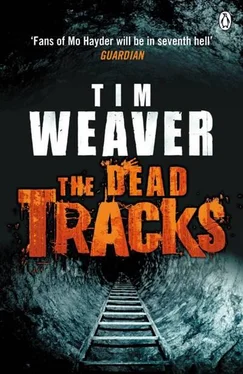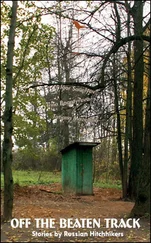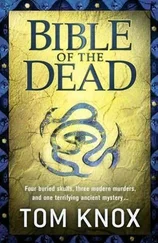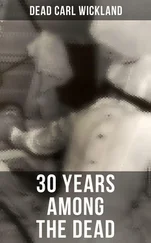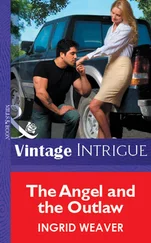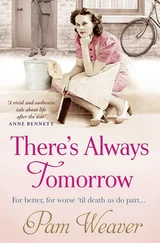The journey over took forty minutes. I went via Barton Hill, to get a sense of where it was. It was closed. A brass sign on the front said it was open Monday to Friday, 9 a.m. to 9 p.m. The building was about a quarter of a mile from the Carvers' place - close to King's Cross station, in a thin triangle of land between two main roads — and had all the aesthetic beauty of a shipping container: no windows; corrugated steel panels to about the eight-foot mark, where uniform red brickwork took over; and a big rusting door with an oversized padlock. Maybe all the money had been spent on the inside.
I got back on to Pentonville Road and headed for the Carvers'. At the house the gate was already open. I walked up the drive and saw James Carver standing in the entrance, filling it with his huge frame, his eyes watching the skies as dark clouds finally began to rupture and rain started to fall. We shook hands and moved inside.
Caroline was in the kitchen. She looked up and said hello to me. Immediately I could feel an atmosphere between the two of them. Carver obviously still felt betrayed by her. I imagined, in a strange way, he also felt like he didn't know his daughter as well as his wife had; a feeling magnified further now she'd disappeared.
We sat in the living room while Caroline put some coffee on. Behind us, in the corner of the room, Leigh was playing with a wooden train set.
'How are things going?' Carver asked.
'They're progressing. I've got a couple of good leads. One is the reason I'm here today.'
He held up his hands. 'Whatever it takes.'
Caroline came through with a tray of coffees and some biscuits. She laid them down on the glass table between us. I thanked her, and took one of the mugs.
'Is one of the leads Charlie Bryant?' Carver asked.
Their eyes were both fixed on me now, waiting for the answer. On the drive over, I'd decided I wasn't going to bring up the events of the previous day — even though they'd probably read about it in the morning papers. But now they were looking at me and asking me what they really wanted to know: Is Megan dead as well?
'At the moment there's nothing to connect this to Megan, other than the fact that she knew him.'
Deep down, in their darkest moments, they'd probably glimpsed a similar end for their daughter. Her in a field, or in a backstreet. Them standing in the subdued light of a morgue while Megan's body, naked and broken, lay rigid in front of them.
'Does the name Barton Hill mean anything to you?'
Carver frowned. Caroline started nodding.
'Yes,' she said. 'Megan used to go there until she disappeared. It's a youth club, some kind of community project. They help teenagers with cerebral palsy.'
'Ah, the youth club,' Carver said, trying a little too hard. I'd been right: he definitely felt like he was standing on the wrong side of the glass now; staring in at a daughter, and her mother next to her, wondering what else lay buried at their feet.
'So can you tell me anything else about it?'
Caroline shrugged. She was still prickly. Carver flicked a look at her. She picked up on it and turned back to me. 'Only what Megan told me. They laid on activities for kids with cerebral palsy, gave them a chance to do something normal, while giving their parents a break.'
'So what made her decide to start going?'
'There was a work placement scheme going on at her school,' Caroline said, glancing at her husband. He looked like he didn't know any of this either. 'She really wanted to do something with disadvantaged kids, and kids with disabilities. So she spoke to her teachers and they came back with a list of places where she could go and get some experience for a fortnight. Barton Hill was where she ended up.'
'And she kept going after the work placement ended?'
Caroline nodded. 'She liked it.'
'Did you ever meet the people who ran it?'
'Only in passing. Jim usually did his weekly accounts on a Wednesday night, so I ended up being the one that ferried her back and forth. I met a few of the people there, just from taking her and picking her up again.'
'Anyone you remember?'
She paused, thought about it. 'The guy who ran it was called Neil Fletcher. There were two or three others, but I never really talked to them much.'
'Did Megan ever talk about meeting anyone there?'
They both looked at me, eyes brightening, brains ticking over. Suddenly, James Carver was right back in a conversation he'd been slowly drifting out of.
'Do you think she went off with someone she met there?' he said.
'No, I don't think so,' I lied.
I could have told them the truth: that I had a reason to believe she did. That the youth club, and someone who worked there, may have been linked to her pregnancy and her disappearance. But there were things I needed to find out first. There were questions that needed to be answered. And there was a man, somewhere, who knew the truth about where Megan was - and whether we'd ever find her alive.
Chapter Twenty-five
An hour later, I was opening the door to the office and my phone was going. I looked at the display. It was Spike.
'David. Sorry it's taken me a while.'
'No worries. What have you got for me?'
I heard him tapping. 'Okay, the PO box number you asked me to look at…' He paused. More tapping. 'It's for a charity called… uh, the London Conservation Trust.'
Megan had had an email from them. I sat down at my desk and booted up the computer. I'd called them when Spike had first got Megan's telephone records over to me, and all I'd got in return was a short answerphone message. No mention of the charity. No thank you for calling. Just a bored-sounding man in an empty room.
'Anything else?'
'The street address is 150 Piccadilly.'
'One-fifty?'
'Yeah. The building's called Minotaur House.'
I pulled a pad across the desk and started to write down the address. Then stopped, 150 Piccadilly.
That's the Ritz,' I said quietly.
'Huh?'
'150 Piccadilly. That's the address for the Ritz.'
'The hotel?'
'Yeah, the hotel.'
The computer pinged as the desktop appeared. I fired up the internet browser and entered the URL for the Ritz. At the bottom was their street address: 150 Piccadilly. I went to Google and searched for Minotaur House, got nothing, then headed to the Charity Commission website. No mention of the London Conservation Trust there either.
The address was false.
And the charity didn't exist.
I thanked Spike, hung up and went to Megan's Hotmail. The email from the London Conservation Trust was right at the bottom. It had been sent on 27 March. Seven days before Megan disappeared. The design of the newsletter was plain and uninspiring: a green banner across the top with a clean but basic logo, all in a pale green. The 'T' of the Trust was a tree. Beneath the logo was a short message, thanking her for her donation of £10 and telling her the money would be put to protecting parkland. There was no street address or phone number. No links or attachments.
I read the message.
Dear Megan,
Thank you for your donation of £10. We want to protect the city's parkland and make a genuine difference - and that means we don't just want to imagine a world where animals are running free in their natural habitat, we want to see it in action!
At the time of writing, we are engaged in ten different campaigns, and every pound you send to us helps maintain parks and parklands in our capital, and in turn brings flora, animals and people together.
If you want to be on the frontline, join our march to Parliament next Monday where we will be trying to persuade government ministers to make the protection of local wildlife more of a priority in the coming year. See the website for more details or enter your email to sign up to our weekly newsletter and get the most up-to-date info delivered straight to your inbox!
Читать дальше
